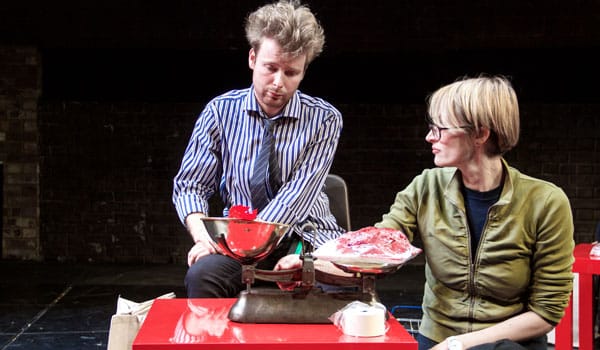
The Miniaturists
Arcola Theatre, Studio 1
15/11/15
2 Stars
For the last ten years The Miniaturists have brought together writers and other theatre collaborators to stage five plays of no more than 20 minutes length on diverse themes. The idea is that these are fully staged plays not workshops or public readings in which the full apparatus of lighting, costume and design are deployed on the set or stage of the host venue – in this case the Arcola’s Studio 1. It’s an excellent idea, but it does depend crucially for its success on the quality of the writing, and this year the short plays offered fairly thin gruel.
Writing short plays is comparable in some respects to writing a lecture or a short story. Best to take one idea and develop it suggestively rather than overcrowd the framework with material that yearns for a larger format. Give the audience enough material economically evoked and let their imagination collectively fill in the gaps. For the most part the writers of these playlets followed this principle of self-containment but the execution remained wayward and unsatisfying in other regards.
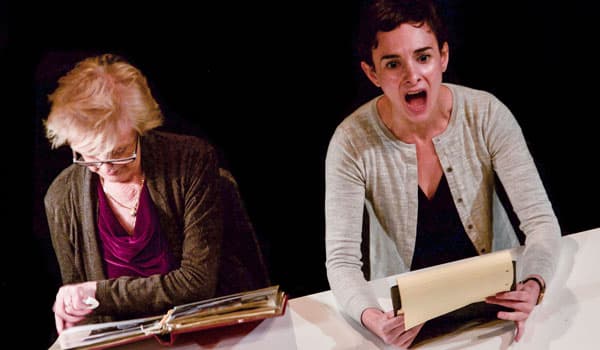
In ‘Twins’, two actors sit at a table, one with a photo album and the other a clipboard. It is the story of twins, one of whom lived to old age, and the other dies shortly after birth within the limits of the play’s time as signaled by a digital clock on the table. Phyllis McMahon uses the album to talk her way through her life, and here the writing is affectionate, colourful and successful in building up character. Simona Bitmate talks across this narrative giving essentially a medical account of her twin’s short life. However, this device wears thin quickly. Having the two actors talk across one another is tiresome after a while, especially as the two accounts do not creatively fuse in an interesting way. Parallel lines that don’t intersect become boring eventually.
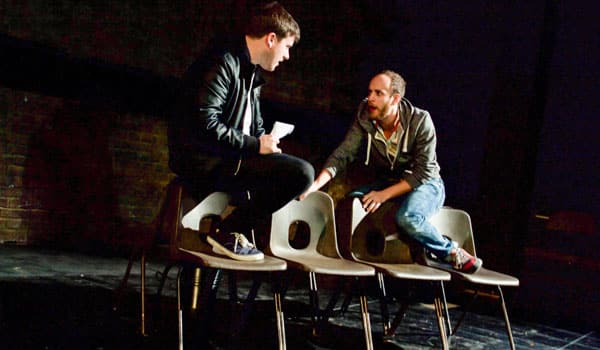
The second play ‘If we got some more cocaine I could show how I love you’ writer John O’Donovan presents another two-hander between Mikey Shannon (Sean Fox) and Casey Brennan (Mark Conway) perched on top of a row of chairs, representing a roof-top vantage point. They have retreated there after stealing money to feed a drugs habit. The dialogue is funny, well developed thematically and generous in the opportunities it gives to the actors. It feels more like a scene taken from a larger and longer narrative rather than a truly self-contained piece, but still flows plausibly and effectively.
‘Checkout’ is a larger scale piece of writing in which Poppy Corbett revisits the theme of judgment after death so famously portrayed in Frank Capra’s ‘It’s a Wonderful Life’. Three customers and three cashiers in a supermarket are engaged in checking out goods, but this is no ordinary supermarket. It is an eternal reckoning as the customers come to realise that they are being evaluated for their actions in this life. All three are found wanting, with some neat, witty riffs along the way on all the supermarket jargon we love to hate (there are some very ‘unexpected’ items in the bagging area!). However, the way in which at least two of the characters get ‘a bag for life’, or second chance, is curiously rushed and unexplained, and the piece seems to end rather too abruptly given what it has set in motion.
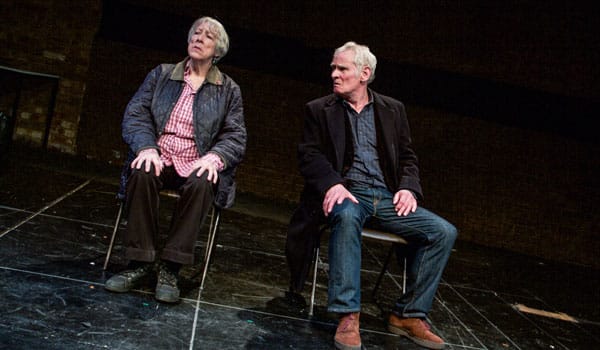
The second half of the evening offered some fine acting but deployed around very sketchy materials. Karl Johnson and Sue Porrett are both experienced players, but here their talents are not really tested in Owen McCafferty’s slight piece about an elderly couple trying to resume contact after a long period of not communicating, before getting lost in the same mutual incomprehension and frustration that had brought about their silence in the first place. The audience liked this dialogue a lot but really this is territory so thoroughly colonised by Beckett and Pinter that it is very hard work to open up new perspectives.
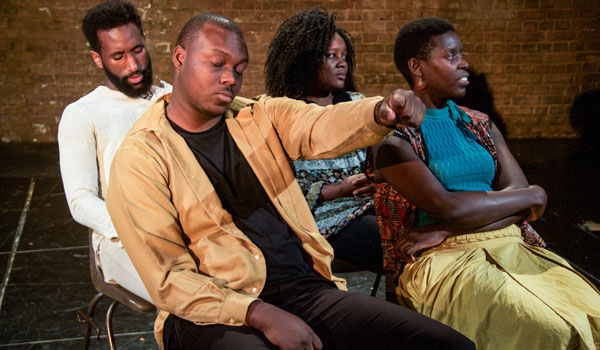
The final, and most puzzling piece of the programme was ‘Kampala, by Stephen Jeffreys, which offered three vignettes of the post-colonial history of Uganda’s capital and its citizens. This was performed with verve and verbal precision, and plenty of energetic movement by the four players; but it was not clear to me where the piece was headed. The opening scene, an evocation of the independence ceremonies in 1962 was more descriptive than evaluative, and the tone of the later two scenes from the rule of Idi Amin was unstable, never fully comic or tragic, with little in the way of resolution. To my mind the playwright never clearly revealed his hand.
It is a year now since I started reviewing plays regularly, and in that time I have regularly noted the outstanding range and quality of the acting talent and technical creative support that there is in Greater London. Almost always there is a performance to praise or a design element to single out for comment, however remote the fringe venue, and however limited the budget. Just as frequently, though, I have noted the rarity of raw writing talent. Often the plays I have seen contained moments of insight or interesting concepts that would have benefited from further workshop development or from the involvement of a dramaturg. But I also have to go further and say that I have also seen a great deal of work that is simply derivative or based on too limited an experience of life or too abstracted a concept that never sparks into being.
Where I have seen real talent is more often than not in material that emerged from writers working well away from metropolitan London. It might seem a paradox, given the huge diversity of London life, but urban life can also produce a narrowing of range too, especially if writers focus too obviously on spiritual and material deprivation and grittiness in a predictably plangent fashion. With the death of provincial repertory theatre, the connections between the theatre world of London and ‘the provinces’ have atrophied, and where The Miniaturists could make a real difference is in taking their project of fully-staged short plays into other parts of the country and gathering in work from local authors.
The production of plays from the Lancashire School that I reviewed at the Finborough Theatre recently, reminds us of the sterling work that was done by pioneers such as Annie Horniman in fostering new out-of-London writing in the Edwardian era. We need more of the same entrepreneurial drive today if the real writing talent that is out there in the country is to be fully developed and brought to public notice.
